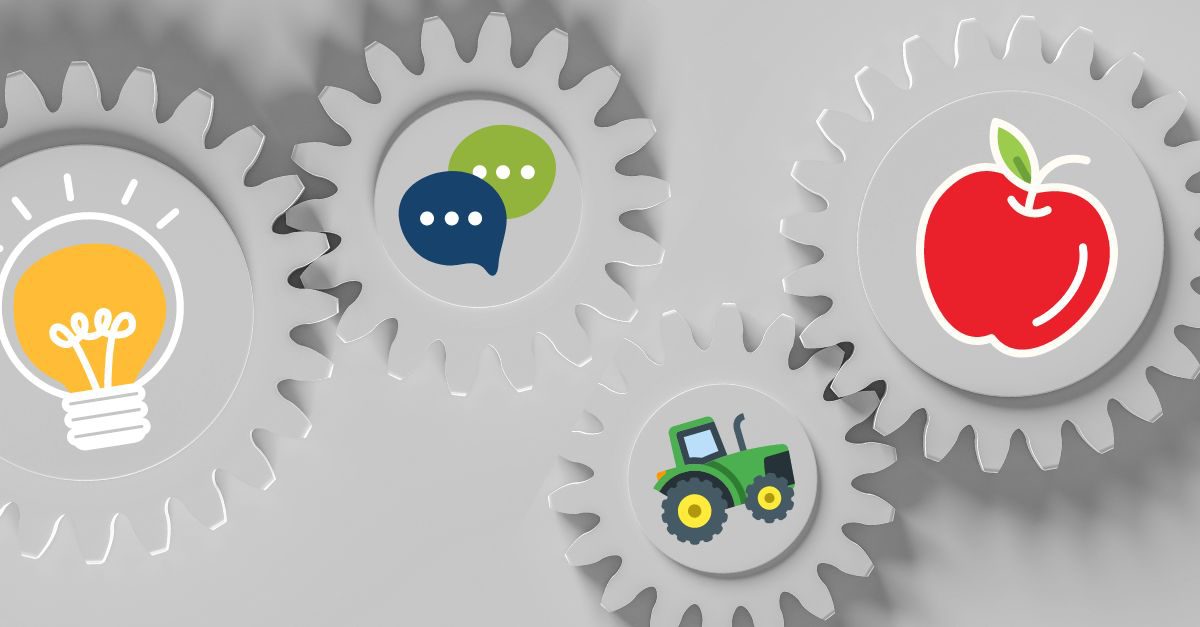
Michael McGee, Director of Innovation at Bioenterprise, and Dr. Lenore Newman, Director of the Food and Agriculture Institute at the University of the Fraser Valley (UFV) explain why agri-tech accelerator programs are critical for the future of food
By Tabitha Caswell for Bioenterprise
Boosting the innovation, commercialization, and adoption of promising new agri-food products and technologies, agri-tech accelerator programs play a significant role in connecting the moving pieces of our modern food system.
But these programs don’t run themselves. Who is behind them and why are they important for Canada and the rest of the world?
In this Inside Bioenterprise article, we’ll demystify the purpose of accelerators and why they’re pivotal in fostering the development, growth, and adoption of agricultural and food technologies. We’ll also explain how accelerator programs work and who is leading them.
From local to global impact, you’ll gain a foundational understanding of how these programs and organizations empower entrepreneurs, introduce cutting-edge innovations into our food systems, and strengthen our economy.
Dr. Lenore Newman, Director of the Food and Agriculture Institute at the University of the Fraser Valley (UFV) and author of multiple books and publications, including a co-authored research paper, The Role of Incubators and Accelerators in the Fourth Agricultural Revolution: A Case Study of Canada (2021), brings her perspective.
Also joining in the conversation is Michael McGee, Director of Innovation at Bioenterprise. With extensive board experience in both private and public companies, Michael has been investing risk capital in small and medium enterprise businesses since the early 1990s. Wearing many hats throughout his career, currently, he’s a Director of Durum Properties Inc. and Stoked Oats out of Calgary, Alberta.

What is an Agri-Tech Accelerator?
Agri-tech accelerators are specialized programs designed to fast-track the growth and success of new ventures in the agricultural sector. These accelerators offer a combination of funding, mentorship, and crucial industry connections, providing a robust ecosystem where emerging companies can achieve their goals.
Unlike incubators, which may support startups for longer durations without a set endpoint, accelerator programs typically operate for a fixed term, like three to six months, pushing for rapid, meaningful progress. Participants benefit from intensive guidance and access to resources, helping them to refine their business models, accelerate product development and commercialization, and scale operations efficiently.
This structured support often begins with an application process or pitch competition and sometimes culminates in a demo day, where entrepreneurs present their innovations to potential investors and industry leaders, aiming to secure further backing and market entry.
Typically, accelerator programs are run by a larger entity or institution – a standalone business or corporation, a government agency, a non-profit, or a university. The organization might manage various programs simultaneously or in cycles throughout the year, providing funding, resources, and strategic direction.
Themes of each program depend on target goals and areas of current focus. They are usually developed through collaborative partnerships between multiple organizations and companies. This collaboration between different stakeholders can be complex, but at the same time, it can create highly successful outcomes.
Dr. Lenore Newman, says, “Accelerator programs are a critical part of any innovation ecosystem. I’ve given them significant study. They provide a key bridge between discovery research and training at universities and the path to research and development (R & D) and venture launch. They provide a pool of resources and a connection to venture capital.”
Essentially, an accelerator is a vehicle for direct engagement with startups, and the organization behind it handles the broad managerial, logistical, and strategic goals to ensure the program’s success and alignment with wider business or economic objectives.

Role of Accelerators in the Canadian Agri-Ecosystem
While agri-tech accelerator programs serve as vital connectors within the agricultural ecosystem, they can also play a crucial role in facilitating the adoption of new technologies.
Bridging the gap between innovative entrepreneurs and the broader industry, these programs often introduce novel innovations to a network of farmers, agribusinesses, and other stakeholders in the ag sector. Activities here can include education and training on the new technologies and demonstrating benefits to encourage uptake on the farm or in production facilities.
In addition, these programs and the organizations running them generate positive economic development that often goes unnoticed by the public. It’s important to recognize the risk that entrepreneurs face while bringing a new business, product, or technology successfully to market. When successful, these ventures create opportunities for a wider audience than their own.
Michael McGee says, “In any given year, Canadian small businesses, which are defined as those with fewer than 100 employees, generally create over 80 percent of the new private sector jobs. Starting a new business is a high-risk endeavour and accelerators provide comprehensive content and mentoring which can significantly enhance their likelihood of success.”
By fostering collaborations with established companies and research institutions, accelerators help address key challenges and integrate new solutions into the market, driving economic return through technological advancement and sustainable agricultural practices on the farm.
Innovation Challenges in Canadian Food and Ag
Canada’s food systems operate under a fragmented and disconnected regional model, causing inefficiencies with communication, allocation and prioritization of resources, and logistical roadblocks.
Michael says, “The disconnect is due to several unavoidable factors including the country’s size, population distribution, and differing regional economies. Sadly, I also think inter-provincial trade barriers and a cumbersome regulatory environment impede business activity. A more collaborative approach between regions would facilitate entrepreneurs’ ability to achieve domestic success, building a solid foundation to expand internationally.”
These issues are compounded by the country’s diverse landscapes and climate extremes which present unique agricultural challenges that agri-tech accelerators are strategically positioned to address. Challenges aside, Canada has great potential to excel.
Learning from other sectors, agri-tech can adapt successful strategies such as leveraging deep-tech innovations and regulatory navigation, enhancing agricultural solution development and commercial readiness to address risk factors contributing to increasing food insecurity.
This cross-industry perspective can drive growth and sustainability in Canada, enhancing efficiency and resilience in the local and global food supply chain.

Global Perspective
Around the world, organizations are pushing the boundaries of agricultural innovation. Their programs support local and global scalability and sustainability, from precision farming tools to advanced bio-tech solutions and more.
Examples include Agri-TechE in the United Kingdom (UK) and the European Institute of Innovation and Technology (EIT) Food Accelerator Network (FAN) in Belgium.
Michael McGee says, “Given its size is smaller than Vancouver Island, it’s not really a fair comparison for Canada, but I think Israel, with a population of 10 million, has an exceptional innovation ecosystem.”
The Kitchen FoodTech Hub is run by Strauss Group, one of Israel’s largest food manufacturers. Technically an incubator, this organization is worth mentioning. Its programs aim to foster technology innovations in food and beverages and are known for supporting startups in alternative protein, sustainable packaging, and smart farming technologies.
“The ‘quadruple helix’ approach of The Netherlands is the best model,” says Dr. Newman, referring to its innovation strategy that considers interaction and coordination between four groups of stakeholders: community citizens, entrepreneurs, government, and researchers, adding, “TopSector stands out as a clear leader.”
TopSector Agri & Food brings the worlds of academia, business, government, research, and social organizations together to maximize efficiency and accelerate food and agriculture innovation. To date, its work has resulted in over 500 projects of all sizes supporting areas such as circular economy, climate risk, health and safety, sustainability and more.
By comparing these international models with Canada’s, we can identify common challenges and unique approaches within our food and farming system, expanding our understanding of what makes agri-tech accelerators successful and valuable on a regional to global scale.
Leadership for Canada
Comparing Canada to the United States (US), Dr. Newman points out Canada’s downsides, stating we have much less venture capital (VC) funding and a less robust angel network. In addition, she explains that US universities are much more aligned with industry and with accelerators and incubators.
Michael McGee says, “Canada is well known for its primary research but does not rank as highly in the commercialization of those initiatives. Many non-dilutive government funding programs help, but I think we can do a better job incentivizing corporate involvement and more active participation by investors.”
Optimistically, Dr. Newman says, “Canada has the raw material to lead the world in food production – land, energy, talent. As an entrepreneur I find this a pretty nice place to build – we have great programs such as Mitacs, Scientific Research and Experimental Development (SR&ED) and others. There is a lot of non-dilutive capital to draw upon.” She adds that accelerator programs, “aren’t sufficient on their own to carry the weight of an ecosystem, they are simply a part of a successful ecosystem.”
Like the organizations mentioned in Europe and Israel, Bioenterprise works to connect all moving pieces within the agri-food-tech machine across Canada, facilitating faster commercialization of novel products and technologies.

Bioenterprise: A Closer Look
As Canada’s Food and Agri-Tech Engine, Bioenterprise has been catalyzing the growth of startups in our agricultural sector for more than 20 years. Yes, the Engine team designs and supports agri-business accelerator programs, but that’s not all this team does.
With deep expertise and an extensive, expanding national network of industry experts, partners, and researchers, Bioenterprise is equipped to support burgeoning agri-tech companies. This consortium is committed to breaking down industry silos, uniting the fragmented pieces of our food systems, and driving agri-food innovation across Canada.
The Bioenterprise Engine offers tailored mentorship, strategic partnership opportunities, and critical funding avenues to help startups refine their innovations and scale their businesses effectively. By providing these comprehensive resources, Bioenterprise ensures that Canadian agri-tech ventures thrive in the competitive global marketplace.
As food systems in Canada and other countries around the world face mounting challenges like climate risks and supply chain disruptions, we can feel better knowing that Bioenterprise and other global organizations are working for positive change.
Stay tuned for future posts as we dive deeper into the technologies and startups shaping the future of agri-food. Join the conversation – share your thoughts and experiences with agri-tech accelerators and supporting organizations on our socials and explore the Bioenterprise website to learn more about our programs and success stories.